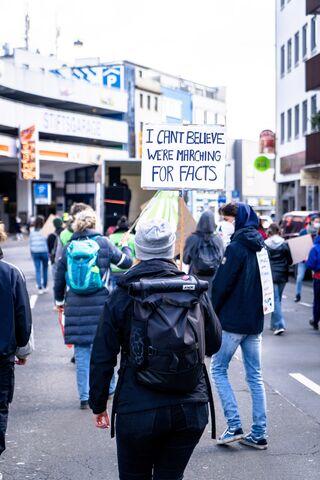The challenges of this time humble me as a science writer and educator. As I participate in discussions about many of the most serious and pressing problems now facing our country and world – problems ranging from vaccine hesitancy to racism, from race relations to climate change – one overarching meta-problem frequently recurs. Coming from different universes of information and social comparison, we don’t agree on the relevant facts.

Theodore Parker once stated that facts are “true, independent of all human opinion.” That is, although we may have wishes for what’s true, previous beliefs about what’s true, and groups telling us what’s true, none of this compares with what’s actually true. Reality has a life of its own.
In the past, we could at least sometimes come together as a people, even if we disagreed on initial solutions to problems, because we agreed on relevant facts. This has largely changed. As a result, we are increasingly polarized and fractured, often incapable of consensus, compromise, civil discourse, and creative problem-solving.
One of the purposes of education is to prepare us to be able to separate fact from fiction. Since many of the problems noted above concern questions about how the world works, science education, in particular, seems at least partly to blame.
What do we need to be able to do to think critically, especially in the scientific realm, as we wrestle with the problems of this time? Below are six essential skills we need as citizens, at least as a start.
- We need to appreciate how science has unique benefits when it comes to understanding what’s true about what can be reliably measured. For instance, nothing gets published in a scientific journal until it’s approved by a team of experts on the topic. After approval, all methods and findings become public, open to scrutiny and attempts to replicate results from other scientists. As further data become available, the scientific process is increasingly likely to get closer to the truth, compared with more biased ways of knowing such as personal experience, intuition, and reason. The scientific process itself is neither liberal nor conservative; it is reality-based and, as such, it is apolitical.
- We need to recognize that just because one person had an experience doesn’t mean it relates to everyone. Nor does a survey of family members, friends, or followers of a politically-oriented media organization necessarily suggest a trend in the general population.
- We need to realize that some well-done scientific studies have the capacity to help us understand problems and what to do about them. If a large sample is randomly assigned to conditions, results may suggest reasonable conclusions about what causes what and what treatments produce what outcomes. Science is less concerned about what produces effects and more concerned this kind of evidence supports the claims being made.
- We need to concede “proof” isn’t possible, outside of math and logic. If we wait for certainty in science, we’ll never reach a conclusion and we’ll never act on anything. Instead, we need to think in terms of what’s more or less likely, in terms of benefits and risks.
- We need to acknowledge how some authorities are more trustworthy in providing conclusions and recommendations than others. Most of us don’t have the time to give complex problems the justice they deserve so we’ll need to rely on individuals and organizations who know better. Politicians, media personalities, family members and friends, social media feeds, e-mail chains, and even respected news sources can mislead us. When possible, it’s preferable to trust reputable authorities and venerable institutions that depend on scientific consensus such as the Centers for Disease Control, Food and Drug Administration, National Academy of Sciences, Association for Psychological Science, American Medical Association, and Intergovernmental Panel on Climate Change.
- We need to be humble enough to accept what we don’t know. As humans, we’re all influenced by biased thinking and groups. We’re often wrong. That’s okay, but it’s vital to realize our limitations if we are to sincerely pursue what’s true.
If we as a people could consistently apply these six skills, our country and world would be much better poised to handle the significant challenges we face. If K-12 education ensured high school graduates were able to demonstrate these skills, our future would be bright.
This post was adapted from an Op-Ed published in the Minneapolis Star Tribune. It also was published at http://www.psychologytoday.com
